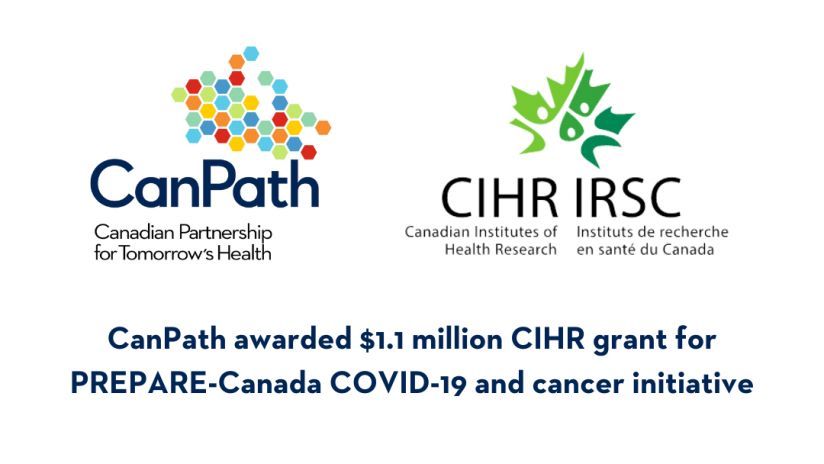CanPath Awarded $1.1 million CIHR Grant for COVID-19 and Cancer Research Project

The PREPARE-Canada initiative will capture the impact of COVID-19 on cancer outcomes in Canada and the impact of COVID-19 on modifying cancer risk in the general population.
The Canadian Partnership for Tomorrow’s Health (CanPath) has been awarded a $1.1 million grant from the Canadian Institutes of Health Research (CIHR) Spring 2022 Project Grant competition through the Institute of Population and Public Health. The initiative, Preparing for the Recovery from the Effects of the PAndemic on cancer control using Real-world Evidence in Canada (PREPARE-Canada), aims to capture how COVID-19 has impacted cancer outcomes at the population level.
“The COVID-19 pandemic has had a significant impact on the lives of Canadians, including the ability to access routine cancer screening and care. While health services have implemented tools to adapt to the pandemic, we anticipate that the true impact of the delays in access to screening and care is still to come. To best prepare our healthcare ecosystem to serve Canadians, we need to quantify the impact of the pandemic on cancer screening, care and outcomes,” says Dr. Philip Awadalla, Nominated Principal Investigator for the PREPARE-Canada Initiative and National Scientific Director of CanPath.
This project will leverage CanPath, the largest population health study in Canada, to capture the effects of the pandemic on cancer incidence patterns and service access. CanPath has gathered extensive COVID-19 data and hosts one of the world’s largest COVID-19 blood serum collections. In parallel, CanPath captures cancer outcome data over time. Baseline and follow-up data from five regional cohorts have been harmonized across the country, creating a pan-Canadian resource of more than 2,800 measures of participant health and lifestyle factors.
PREPARE-Canada aims to:
- Determine the effect of COVID-19 on cancer screening and diagnostic assessments, including the impact on cancer outcomes, in Canada;
- Investigate the impact of SARS-CoV-2 infection in shaping the pathophysiology of cancer risk; and
- Construct models to capture the long-term impact of COVID-19 on cancer burden in Canada.
Dysregulated immune responses have been observed in COVID-19 cases. “We know that immune disruption can drive the development of cancer. This innovative study will bring together unique resources with which to assess the cancer-causing potential of COVID-19 among a diverse group of Canadians,” says Dr. Parveen Bhatti, Principal Investigator for the PREPARE-Canada Initiative.
A comprehensive understanding of the pandemic’s impact on cancer outcomes in Canada cannot be fully achieved without also considering the potential impact of COVID-19 infection on cancer. Elevated levels of inflammation have been observed in COVID-19 cases and appear to persist in long COVID-19. However, the effects of COVID-19 induced inflammation on long-term health outcomes, including cancer risk, are not fully known. A comprehensive assessment of post-acute COVID-19 infection on cancer risk phenotypes is necessary to inform cancer control and monitoring strategies.
“Our study will provide key insights into how cancer screening and diagnostic services have been impacted by the pandemic and quantify the impact of these disruptions on cancer outcomes,” says Kimberly Skead, Co-Investigator for the PREPARE-Canada Initiative, PhD student, and National Scientific Coordinator of CanPath. “In addition, the data and biosamples collected by CanPath enable us to explore how COVID-19 might impact cancer risk at an individual level. These insights will be critical in designing targeted, evidence-based recovery efforts aimed at reducing screening gaps and achieving equitable and timely access to cancer screening-related care.”
CanPath’s PREPARE-Canada initiative is funded through the CIHR Spring 2022 Project Grant competition, which invested approximately $325 million to support health research projects. This investment will support Canadian researchers in studying how the pandemic has impacted demand for cancer services at a population level and how COVID-19 infection changes cancer risk at the individual level.
The PREPARE-Canada research team includes co-investigators from CanPath’s regional cohorts and experts in genomics, cancer, and blood disorders from the Ontario Institute of Cancer Research and the University Hospital Network.
CIHR awarded this grant through the Ontario Institute for Cancer Research. CanPath is jointly housed at the Ontario Institute for Cancer Research and the University of Toronto’s Dalla Lana School of Public Health.
For more information or to arrange a media interview, please contact:
Megan Fleming
Communications & Knowledge Translation Officer
Canadian Partnership for Tomorrow’s Health (CanPath)
info@canpath.ca